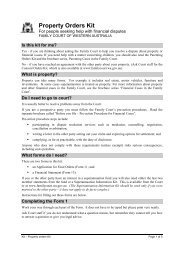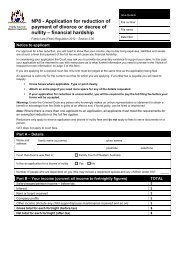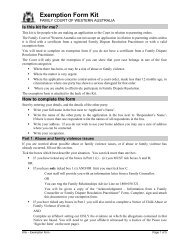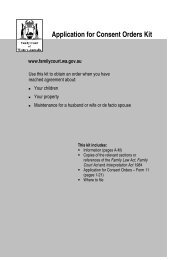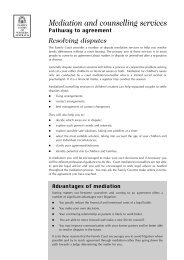Contravention Proceedings Kit - Family Court of Western Australia
Contravention Proceedings Kit - Family Court of Western Australia
Contravention Proceedings Kit - Family Court of Western Australia
Create successful ePaper yourself
Turn your PDF publications into a flip-book with our unique Google optimized e-Paper software.
PARENTING CASES<br />
<strong>Contravention</strong> <strong>Proceedings</strong> <strong>Kit</strong><br />
Respondent<br />
FAMILY COURT OF WESTERN AUSTRALIA<br />
You need this kit if<br />
You have received notification that someone has made an application to the <strong>Court</strong> saying that you have<br />
disobeyed a parenting order.<br />
If you have received notification that someone has made an application saying that you have disobeyed a<br />
financial order, see the fact sheet attached.<br />
What forms will I need?<br />
There are no forms for you to complete, however if you choose to, you may lodge an affidavit.<br />
If you have recently changed address, you should complete a Form 8 Notice <strong>of</strong> Address for Service.<br />
How do I complete the affidavit?<br />
If you decide that you want to lodge an affidavit, ask <strong>Court</strong> staff for a blank Affidavit Form. This form<br />
comes with detailed instructions.<br />
There are many rules about affidavits. It is important to follow them, staff have been instructed not to<br />
accept affidavits which are not in the correct format.<br />
• The affidavit must be typed not hand written.<br />
• The affidavit must be divided into numbered paragraphs. Each paragraph must deal with only<br />
one aspect <strong>of</strong> the subject matter. It is suggested that each paragraph contains not more than about<br />
six lines.<br />
• The affidavit must contain all <strong>of</strong> the evidence upon which you are relying. The Judicial<br />
Officer cannot take into account any facts which have not been included on the affidavit.<br />
• The affidavit must contain facts, not arguments or comments. You will be given the<br />
opportunity to present arguments and make comments in <strong>Court</strong>.<br />
• Your signature must be witnessed by a Justice <strong>of</strong> the Peace (JP), a Lawyer or Notary Public.<br />
You should always try to seek legal advice before signing an affidavit.<br />
Make two copies <strong>of</strong> the affidavit. Post or bring the forms and copies into the registry. By posting the<br />
documents you may avoid a queue. The registry staff will return the two copies. One is for you to keep<br />
and the other must be served on the other party.<br />
Information about how to serve documents is available from the registry in the “Service <strong>Kit</strong>”.<br />
Where do I find a Justice <strong>of</strong> the Peace?<br />
There is usually a JP at the <strong>Family</strong> <strong>Court</strong> <strong>of</strong> WA between 9:30am and 1:00pm. If a JP is not available you<br />
may find one at the Justices’ Association at 25 Barrack Street, Perth. For a JP near your home, telephone<br />
the Justices’ Association on 1300 657 788 or visit their web page www.justice.wa.gov.au.<br />
<strong>Kit</strong>s – Parenting <strong>Contravention</strong> <strong>Kit</strong> (Respondent) Page 1 <strong>of</strong> 5
What happens next?<br />
The case has been listed <strong>Contravention</strong> Conference with a Registrar:<br />
• This conference will be held approximately three weeks after you file your application.<br />
• The purpose <strong>of</strong> the contravention conference is to identify the issues in your case, so that the<br />
Registrar can decide the best way to run the final hearing. It also provides you with an opportunity to<br />
resolve your dispute.<br />
• The Registrar does not decide the outcome <strong>of</strong> your case at the contravention conference.<br />
• You will be given instructions at the end <strong>of</strong> the Conference, telling you what you must do before your<br />
hearing.<br />
After your conference, your case will be listed for a final hearing before a Judicial Officer:<br />
• The final hearing may not be held for several weeks.<br />
• You must follow the instructions the Registrar gave you at the contravention conference.<br />
• At the end <strong>of</strong> the hearing the Judicial Officer will make a decision. They may not deliver this decision<br />
on the day <strong>of</strong> the hearing.<br />
• You will be told when the Judicial Officer will deliver their reasons for the decision.<br />
Solving the problem outside <strong>of</strong> <strong>Court</strong><br />
If you and the other party come to an agreement, you can draft a new set <strong>of</strong> parenting orders. You will<br />
need to apply to the <strong>Court</strong> to have this agreement made into a legally binding consent order. For more<br />
information about how to do this, contact your Case Coordinator or ask for a copy <strong>of</strong> the “Consent Order<br />
<strong>Kit</strong>” from the Registry.<br />
What happens on the day <strong>of</strong> the conference?<br />
Check the <strong>Court</strong> list noticeboard to see where the conference is to be held. Report to the <strong>Court</strong> Officer on<br />
that floor. The Registrar will call each party into a conference room to begin discussions.<br />
At the end <strong>of</strong> the conference the Registrar will make ‘procedural’ orders setting out what you must do<br />
before the next hearing.<br />
You may have to file more documents with the <strong>Court</strong>. You must file these documents by the due date.<br />
Failing to file documents by this date may affect what happens at trial.<br />
You will also be told the date <strong>of</strong> your next hearing after the conference.<br />
What happens on the day <strong>of</strong> the hearing?<br />
Check the <strong>Court</strong> list to see in which <strong>Court</strong> your case is to be heard. Make sure you are seated before the<br />
time set for your matter.<br />
If you are not present when your case is called orders may be made in your absence. There may be more<br />
than just your case listed on the same day. The Judicial Officer will find out which cases are ready to<br />
proceed and where possible will advise the order <strong>of</strong> the hearing.<br />
There will be a lunch break between 1:00pm and 2:15pm and the <strong>Court</strong> will normally finish by about<br />
4:30pm. If your case is not finished, you will have to come back on another day.<br />
When your case is called walk forward and stand behind the microphone on the left hand side <strong>of</strong> the desk<br />
in front <strong>of</strong> the Judicial Officer. If you have a lawyer they will show you where to sit. The Judicial Officer<br />
will find out whether you are pleading ‘guilty’ or ‘not guilty’.<br />
The Judicial Officer will then ask the other party to move into the witness stand. They will be asked to<br />
confirm what they have said in their affidavit. As their evidence is being given you should note down any<br />
questions you wish to ask.<br />
<strong>Kit</strong>s – Parenting <strong>Contravention</strong> <strong>Kit</strong> (Respondent) Page 2 <strong>of</strong> 5
The other party will then be asked questions by you or your lawyer, this is called cross examination. If the<br />
other party has any witnesses, you will be given the opportunity to do the same to them. If you do not ask<br />
questions in cross examination, the Judicial Officer will assume that you agree with their version <strong>of</strong><br />
events.<br />
Once the other side and their witnesses have finished giving evidence it is your turn. If you did not submit<br />
an affidavit you will have to give your evidence orally. You do not have to give evidence, but remember;<br />
the Judicial Officer can only rely on the evidence given, if you choose not to give any evidence, the<br />
Judicial Officer will assume it is because the other party’s version <strong>of</strong> events is true. You should bring<br />
your witnesses to <strong>Court</strong> so that they can be cross examined. If they do not come their evidence is likely<br />
not to be included.<br />
When their evidence is finished the Judicial Officer will ask both sides to summarise. It is too late at this<br />
point to give any more evidence. The only evidence the Judicial Officer will consider is that contained in<br />
the affidavits and the answers given in the witness stand.<br />
The Judicial Officer will then give the decision, although occasionally the reasons for the decision will be<br />
given at a later date. Do not interrupt the Judicial Officer when the decision is being given.<br />
If you are found ‘guilty’ then the Judicial Officer will ask the other party what they think the penalty<br />
should be. The Judicial Officer will include this in their final decision. The Judicial Officer may order<br />
make up time with the children or a penalty. For further information see the Form 18.<br />
This will usually be the end <strong>of</strong> the case, but if lawyers are involved there may be an argument about who<br />
has to pay legal fees.<br />
A decision by a Judicial Officer can only be appealed if there has been an error <strong>of</strong> law or mistake <strong>of</strong> fact.<br />
You should seek legal advice if you want to appeal a decision.<br />
Child minding service<br />
There is a free child minding service on level three. Please arrive in plenty <strong>of</strong> time to settle your child.<br />
The service is closed between 1:00pm and 2:00pm and your child can only remain in the service for three<br />
hours.<br />
Seek legal advice<br />
You should get legal advice before deciding what to do. A lawyer can help you understand your legal<br />
rights and responsibilities, and explain how the law applies to your case. A lawyer can also help you<br />
reach an agreement with the other party without going to <strong>Court</strong>.<br />
You can get legal advice from a:<br />
• Legal Aid Office;<br />
• Community Legal Centre; or<br />
• Private law firm.<br />
<strong>Court</strong> staff can help you with questions about <strong>Court</strong> forms<br />
and the <strong>Court</strong> process, but cannot give you legal advice.<br />
<strong>Kit</strong> – <strong>Contravention</strong> <strong>Proceedings</strong> <strong>Kit</strong> (Respondent) Page 3 <strong>of</strong> 5
Need more information?<br />
For more information about <strong>Family</strong> Dispute Resolution, or to find your nearest <strong>Family</strong> Relationship<br />
Centre:<br />
• go to www.familyrelationships.gov.au; or<br />
• call the <strong>Family</strong> Relationship Advice Line on 1800 050 321, the line is open from 8:00am to 8:00pm<br />
Monday to Friday, and 10:00am to 4:00pm on Saturdays.<br />
For more information about the <strong>Family</strong> <strong>Court</strong> <strong>of</strong> WA, including access to the legislation, forms or<br />
publications listed in this brochure:<br />
• go to www.familycourt.wa.gov.au;<br />
• call 08 9224 8222 or 1800 199 228; or<br />
• visit the <strong>Family</strong> <strong>Court</strong> <strong>of</strong> WA registry.<br />
Personal safety<br />
If you have any concerns about your safety while attending <strong>Court</strong>, please call 08 9224 8222 before your<br />
<strong>Court</strong> appointment or hearing. Options for your safety at <strong>Court</strong> will be discussed and arrangements put in<br />
place. By law, people must inform a <strong>Court</strong> if there is an existing or pending family violence order<br />
involving themselves or their children.<br />
Who else can help?<br />
• Legal Aid WA<br />
www.legalaid.wa.gov.au<br />
1300 650 579<br />
• Community Legal Centres<br />
Association <strong>of</strong> WA<br />
www.communitylaw.net<br />
08 9221 9322<br />
• Law Society <strong>of</strong> <strong>Western</strong> <strong>Australia</strong><br />
www.lawsocietywa.asn.au<br />
08 9322 7877<br />
• Aboriginal Legal Service <strong>of</strong> <strong>Western</strong><br />
<strong>Australia</strong><br />
<strong>Family</strong> Law Unit<br />
www.als.org.au<br />
08 9265 6666 or 1800 019 900<br />
• Law Council <strong>of</strong> <strong>Australia</strong> – <strong>Family</strong><br />
Law Section<br />
www.familylawsection.org.au<br />
02 6246 3788<br />
This brochure provides general information only and is not provided as legal advice. If you have a legal issue, you should contact a lawyer before<br />
making a decision about what to do or applying to the <strong>Court</strong>. The <strong>Family</strong> <strong>Court</strong> cannot provide legal advice.<br />
The <strong>Family</strong> <strong>Court</strong> respects your right to privacy and the security <strong>of</strong> your information.<br />
V6 - 070708<br />
<strong>Kit</strong> – <strong>Contravention</strong> <strong>Proceedings</strong> <strong>Kit</strong> (Respondent) Page 4 <strong>of</strong> 5
FINANCIAL CASES<br />
<strong>Contravention</strong> <strong>Proceedings</strong> <strong>Kit</strong><br />
Respondent<br />
FAMILY COURT OF WESTERN AUSTRALIA<br />
You need this kit if<br />
You have received notification that someone has made an application to the <strong>Court</strong> saying that you have<br />
disobeyed a financial order, (an order not affecting children).<br />
For more information about contravention proceedings read the attached “Parenting Cases <strong>Contravention</strong><br />
<strong>Proceedings</strong> <strong>Kit</strong>”.<br />
What forms will I need?<br />
There are no forms for you to complete, however if you choose to, you may lodge an affidavit.<br />
If you have recently changed address, you should complete a Form 8 Notice <strong>of</strong> Address for Service.<br />
How do I complete the affidavit?<br />
If you decide that you want to lodge an affidavit, ask <strong>Court</strong> staff for a blank Affidavit Form. This form<br />
comes with detailed instructions. Read the attached “Parenting Cases <strong>Contravention</strong> <strong>Proceedings</strong> <strong>Kit</strong>” for<br />
more information about how to complete the affidavit.<br />
What happens next?<br />
The case has been listed for a <strong>Contravention</strong> Hearing.<br />
Read the ‘What happens on the day <strong>of</strong> the hearing’ section <strong>of</strong> the attached “Parenting Cases<br />
<strong>Contravention</strong> <strong>Proceedings</strong> <strong>Kit</strong>” for more information about what to expect during the contravention<br />
hearing.<br />
At the end <strong>of</strong> the contravention hearing the Judicial Officer will decide the penalty for the contravention.<br />
Information about the penalties for failing to comply with a financial order can be found on the Form 18.<br />
This brochure provides general information only and is not provided as legal advice. If you have a legal issue, you should contact a lawyer before<br />
making a decision about what to do or applying to the <strong>Court</strong>. The <strong>Family</strong> <strong>Court</strong> cannot provide legal advice.<br />
The <strong>Family</strong> <strong>Court</strong> respects your right to privacy and the security <strong>of</strong> your information.<br />
V2 - 070708<br />
<strong>Kit</strong>s - Financial <strong>Contravention</strong> <strong>Kit</strong> (Respondent) Page 5 <strong>of</strong> 5


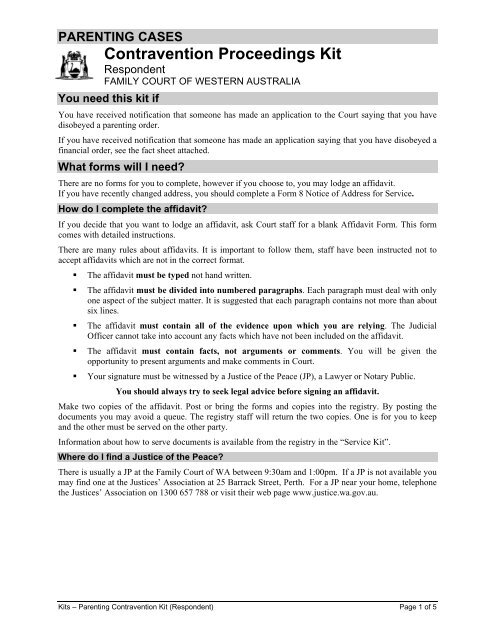
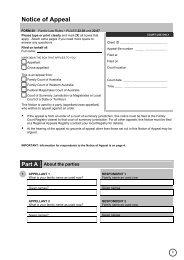
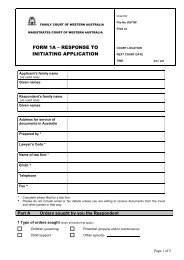
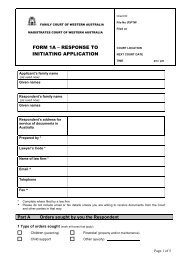

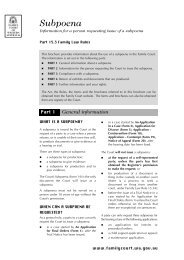
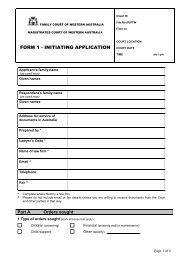
![Y and M [2007] - Family Court of Western Australia](https://img.yumpu.com/46403729/1/184x260/y-and-m-2007-family-court-of-western-australia.jpg?quality=85)

